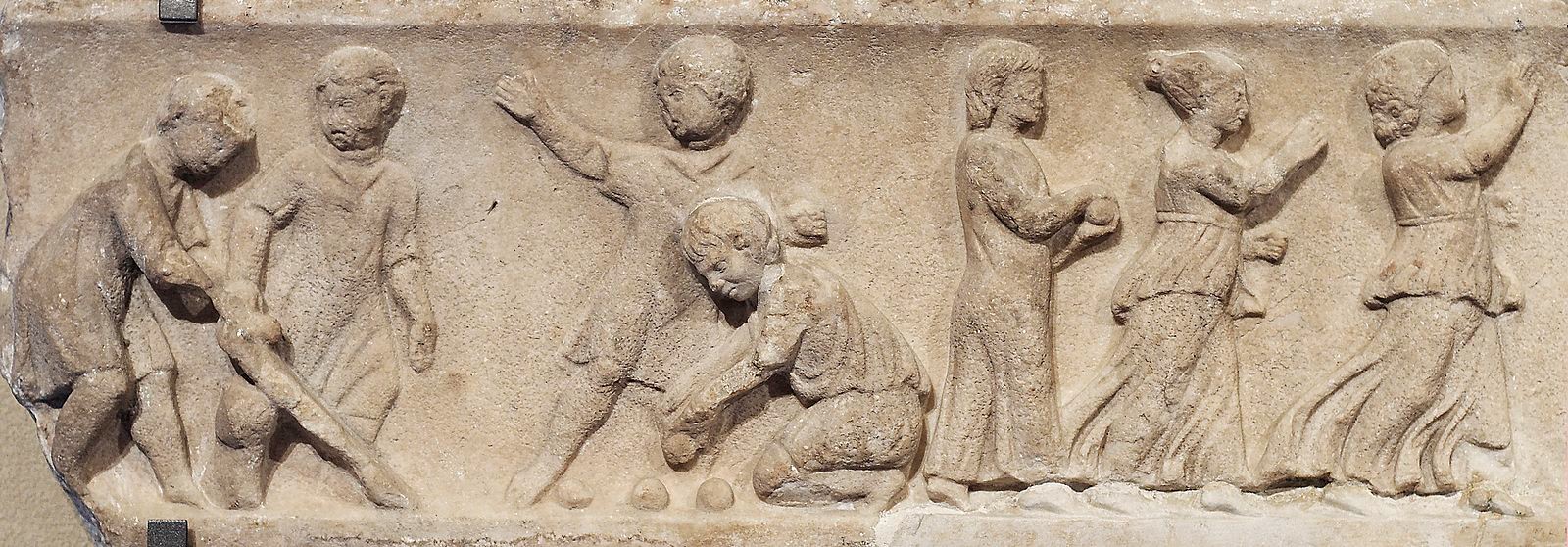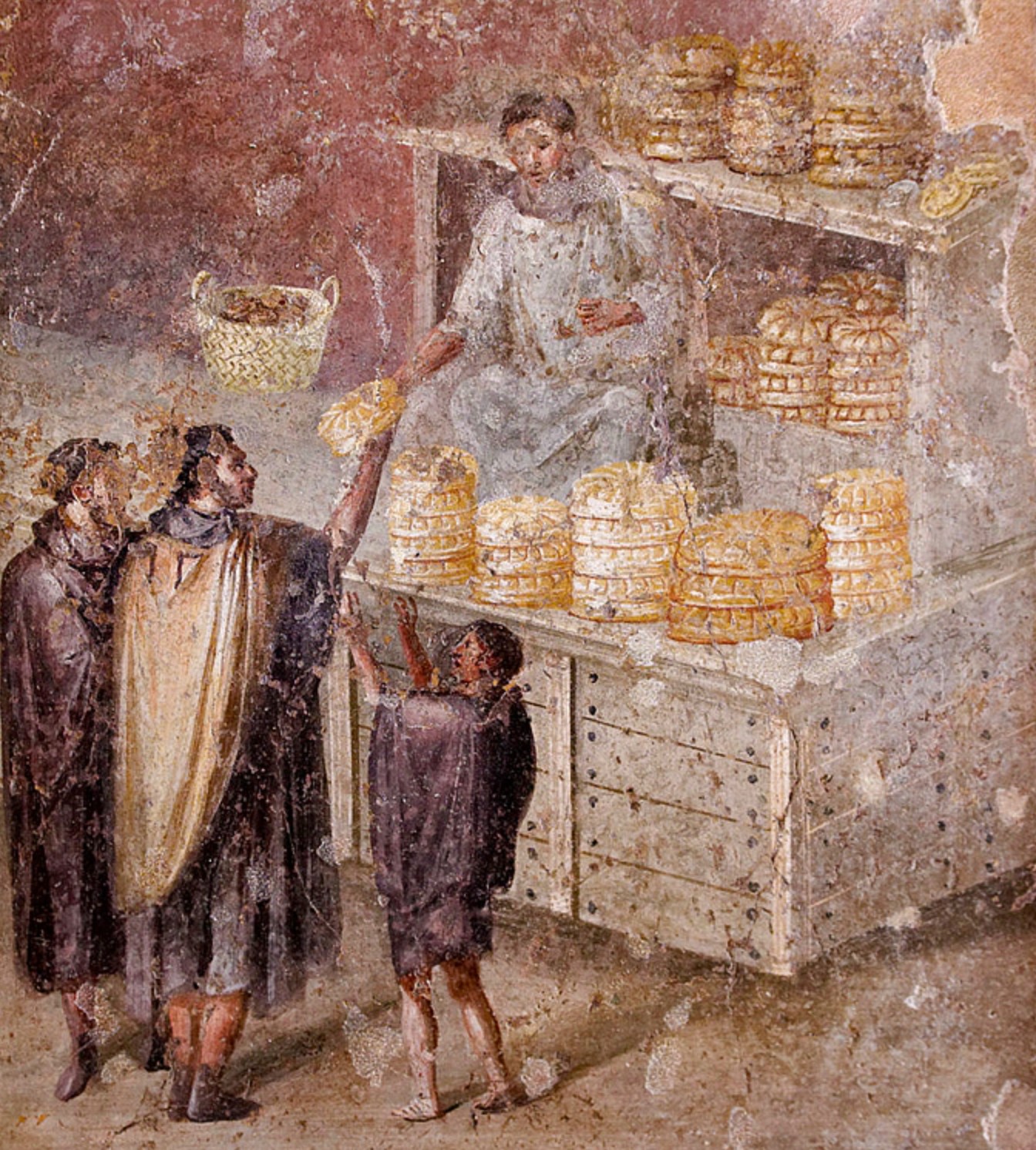77 2. Introduction to Deponent Verbs
“I want to teach you one more thing before they arrive. Do you remember passive verbs?” I do.
“THERE ARE SOME VERBS IN LATIN THAT ARE PASSIVE IN FORM BUT ACTIVE IN
THEIR MEANING. These are called Deponent Verbs, and almost all of their forms are passive. Let’s start with two simple examples, the first a 1st Conjugation (A-Verb) and the second a 3rd Conjugation (I-Verb); put these in your vocabulary:”
precor, precārīto pray
sequor, sequ-īto follow
“Precor, although its form is the first person passive, means ‘I pray’ (not ‘I am prayed’); precārī, although its form is the passive infinitive, means ‘to pray’ (not ‘to be prayed’). The same is true of all the other forms with person, number and tense. So, in the present tense you would translate like this:”
Deponent Verbs, Present Tense, Examples (D)
precorprecāmurI praywe pray precāris/reprecāminīyou prayyou all pray precāturprecanturhe she it praysthey pray
“And sequor, a 3rd Conjugation Verb, would look like this:”
sequorsequimurI followwe follow sequeris/resequiminīyou followyou all follow sequitursequunturhe she it followsthey follow
Oh, I said, nōn sequitur – right?
“Right! Literally, ‘it does not follow.’ We will talk about the other tenses on another day. But that’s a good start for deponent verbs.”
We pray, and you all need to pray. (14)
A famous leader follows virtue where it leads, even by a harsh road. (15)
Once the procession reached the top of the ridge, the crowd gathered around the statue on the litter. The litter-bearers carried Venus over to her shrine and put her on a pedestal. The statue was made of bright white marble; its face had dark gems for eyes and was shining with oil and perfume. Incense was burning on the altar and the air was heavy with fragrance. Several women stepped forward and wrapped more garlands around the statue, tying them to nearby cedarwood beams so that Venus looked like she was bound in place.
The participants next turned their attention to a choir of boys and girls who, to judge by their missing teeth, were somewhere between 6 and 12 years old. They were dressed in their best clothes, their hair oiled and styled. They began singing a hymn for Venus which lasted a good long time. I could not understand the lyrics at all; Latinitas explained that this was because they spoke a very archaic form of Latin. As they sang, they did a simple dance that involved stomping
or hopping on the ground in a kind of waltz rhythm, 1-2-3, 1-2-3; according to Latinitas this was called Salian dancing.
When they were done, everyone turned their attention to a short, chubby, bald old man with a big wide face. He climbed up on a small wooden platform so it would be easier to see him; as he passed the children, he gave them kisses or messed up their hair. Some adults began to call his name: Hōrātī, Hōrātī. He was joined by a young man who introduced him to the crowd.
“This is the poet Horace,” Latinitas said, “Quintus Horatius Flaccus. He has been invited here by Paulus Maximus, who is introducing him, to read a dedicatory poem for the installation of Venus’ statue.”
Horace addressed the crowd, doing imitations of people I did not know; he made a lot of jokes, to judge by the laughter that his remarks elicited. He seemed very friendly and was constantly shifting his moods and facial expressions. Then, turning to face the statue, he began reciting a poem he had composed for the occasion, which went like this. I was able to understand the parts in italics, and you can too – match the English and the Latin (16):
Intermissa, Venus, diū rūrsus bella movēs? Parce, precor, precor. Nōn sum quālis eram bonae sub rēgnō Cinarae. Dēsine, dulcium māter saeva Cupīdinum, circā lustra decem flectere mollibus
iam dūrum imperiīs: abī, quō blandae iuvenum tē revocant precēs.
Wars interrupted so long – are you setting them in motion again, Venus? Spare me, I pray, I pray. I am not like I was under the reign of good Cinara.
Cease, savage mother of sweet Cupids, to steer around a tenth five-year cycle me, now hardened to your soft commands; go away where the flattering prayers of youths call you.
Tempestīvius in domum Paulī purpureīs alēs olōribus cōmissābere Maximī, sī torrēre iecur quaeris idōneum; namque et nōbilis et decēns et prō sollicitīs nōn tacitus reīs et centum puer artium lātē sīgna feret mīlitiae tuae.
“It is rather time that you bring your party, flying on purple swans,
to the house of Paulus Maximus, if you seek a liver prime for your roasting;
For he is a noble and decent and for anxious defendants not silent,
and he, a boy of a thousand arts, will carry the flags of your service far and wide.”
Et, quandōque potentior largī mūneribus rīserit aemulī, Albānōs prope tē lacūs pōnet marmoream sub trabe citreā. Illīc plūrima nāribus dūcēs tūra, lyrāque et Berecyntiā dēlectābere tībiā mixtīs carminibus nōn sine fistulā;
“And once he, superior in his gifts, laughs at a lavish rival,
he will set you up near the Alban lakes, in marble, under cedar beams.
There you will draw much incense through your nose, and delight
in songs mixed with the lyre and Berecyntian flute, not without the pipe.”
Illīc bis puerī diē nūmen cum tenerīs virginibus tuum laudantēs, pede candidō in mōrem Salium ter quatient humum.
Mē nec fēmina nec puer iam nec spēs animī crēdula mūtuī nec certāre iuvat merō nec vincīre novīs tempora flōribus.
There twice a day the boys with the tender virgins, praising
your divinity, will, with white foot, shake the ground three times in Salian custom.
No woman, no boy, no credulous hope for a mutual mind
helps me, nor does competing at wine, or binding my forehead with new flowers.
Sed cūr heu, Ligurīne, cūr mānat rāra meās lacrima per genās? Cūr fācunda parum decōrō inter verba cadit lingua silentiō?
Nocturnīs ego somniīs iam captum teneō, iam volucrem sequor tē per grāmina Mārtiī Campī, tē per aquās, dūre, volūbilīs.
But why, alas, Ligurinus, why does the rare tear drip across my cheeks?
Why does an eloquent tongue fail in between words in an unsuitable silence?
In nocturnal dreams I hold you, now a captive, now on wings, as I follow
you across the grass of the Campus Martius, you across the rolling waters, harsh one.
When he was done, he climbed down from the platform and ran after the crowd of children, who shrieked and dispersed into the surrounding meadow; Horace had a slight limp and did not bother to chase them.
What followed was, well, something you would find familiar if you saw it – a cookout. The only difference is that the animal was killed on the spot, sacrificed to Venus. We lingered on the edge of the crowd; Latinitas made conversation with some people, and thankfully, she did not grab me and make me practice my Latin. I had my eye on the kids, and I realized that they were playing a game that we would call hide-and-seek. A searcher would cover his or her eyes and count while the children hid. When the searcher came looking for them, they would yell hīc, here!, and run
for the shrine, which was apparently the safe space. While Latinitas was making conversation, I joined them for a few rounds, and managed not to get tagged. I’m not going to boast too much about my success at the game, because I was more than twice as old as some of them.
It was when I decided to stop that I heard words that stopped me in my tracks. It came from one of the children who was in hiding, who had been looking curiously at my purple bathrobe. I heard the very same phrase that I heard the first night I met Latinitas. This time, after I repeated it for Latinitas, she helped me distinguish and understand the words.
The pronunciation, as I mentioned earlier, was a little old-fashioned; but basically what the child was saying was this:
Purpureā istā cum togā rēgālis esse vidēre. With that purple toga you seem to be royalty!
So what does that mean? I asked her.
“The Romans have always associated the color purple with the dress of kings. And that bathrobe of yours… well, it’s purple.”
But why did I hear that phrase the night I met you?
She looked me in the eye for the longest time. Then she shrugged her shoulders… and we were instantly transported back to my apartment, which looked the same as always.
But I did not feel the same. Royalty? What was that about?
 Līberī ludentēs in sculptūrā marmoreā, saeculō secundō post Christum; children playing on a marble relief sculpture, from the second century CE.
Līberī ludentēs in sculptūrā marmoreā, saeculō secundō post Christum; children playing on a marble relief sculpture, from the second century CE.

- A fresco painting from the House of the Baker in Pompeii. Pistor in tabernā panem ēdit; the baker in his shop gives out bread.